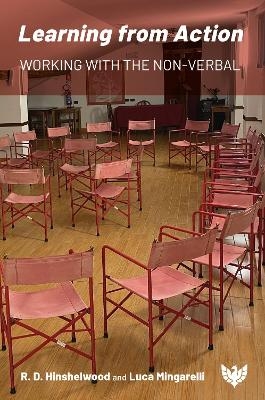
Learning from Action
Phoenix Publishing House (Verlag)
978-1-912691-21-0 (ISBN)
Since the early 1990s, Enrico Pedriali with R. D. Hinshelwood organised workshops in Italy known as the learning from action workshops. This novel approach evolved from applying the principles of therapeutic communities to a group relations form of experiential conference. The group relation tradition, however, does not focus particularly on mental health organisations and tends to focus on senior management issues of leadership and authority. In contrast, the learning from action workshops are tailored to the care workers engaged in the direct work, in particular for those working with clients and patients with significant problems with verbal and symbolic communication. The workshops also include an element of research into the unconscious messaging systems employed in making relations, which contribute to therapeutic and other mental health care services. There are also chapters on a related form of workshop – the living and learning experience – which was established primarily for learning about therapeutic communities, which bring further insight to working practices.
The book brings together a community of 21 authors: Giada Boletti, Louisa Diana Brunner, Davide Catullo, Heather Churchill, John Diamond Donna M. Elmendorf, Giovanni Foresti, Rex Haigh, R. D. Hinshelwood, Yuko Kawai, Eriko Koga, Jan Lees, Simona Masnata, Luca Mingarelli, Gilad Ovadia, Mario Perini, Barbara Rawlings, Antonio Sama, Edward R. Shapiro, Lili Valkó, and Zsolt Zalka.
It will be a must-read for those working in mental health care. The information within will be of use to those new to the profession, for whom there is often very little preparation or reading material, and also to more senior members to use not only for their own development but also in training and research activities in mental health.
R. D. Hinshelwood is professor emeritus at the University of Essex, and previously clinical director at the Cassel Hospital, London. He is a fellow of the British Psychoanalytical Society, and a fellow of the Royal College of Psychiatrists. He authored A Dictionary of Kleinian Thought in 1989, and Clinical Klein in 1994. A long-time advocate of alternative psychiatry, he was a founding member of The Association of Therapeutic Communities in 1974; and in 1980 he founded, with colleagues, The International Journal of Therapeutic Communities. He was involved in the Psychoanalysis and Public Sphere conferences in the 1980s and 1990s, and he has contributed each year to the Psychoanalysis and Political Mind Seminars. He has been a member of the Labour Party for fifty years. Luca Mingarelli is chairman of the Foundation Rosa dei Venti no profit. He is a social entrepreneur, psychotherapist (ECP,WCP) and organisational consultant. Since 1997, he is founder and director of Therapeutic Communities for Adolescents. He has worked in University La Bicocca Milan holding workshops. He is also past President and now Associate President of Il NODO Group Association and an OPUS member. He is founder and board member of the International Network Therapeutic Communities (INDTC) and of Mito&Realtà Association with the role of national convener of therapeutic communities for adolescents. He has been director and/or consultant of several international Group Relation Conferences (Italy, Peru, UK, USA, etc.) and of ten “Learning from Action” workshops. He has been a basketball coach and is member of the Order of Journalists. He has written several books on therapeutic communities for adolescents.
Acknowledgements
Our community of 21 authors
Foreword
Donna M. Elmendorf and Edward R. Shapiro
Introduction
R.D. Hinshelwood and Luca Mingarelli
Chapter 1. Applying group relations to therapeutic communities: A marriage with offspring
R.D. Hinshelwood
Chapter 2. Deciding for Surviving: Ideas and Models in Group Relations Conference (GRC) Traditions
Giovanni Foresti and Antonio Samà
Chapter 3. Language in Action: The other side of Group Relations
Mario Perini
Chapter 4. The early intentions
Louisa Brunner and R.D. Hinshelwood
Chapter 5. The LfA programme and its reasoning
Giada Boldetti and Luca Mingarelli
Chapter 6. Snapshots of the process
Simona Masnata
Chapter 7. Reflections on behaviour and relations as meaningful
R.D. Hinshelwood
Chapter 8. A journey called learning from Action
Davide Catullo
Chapter 9. The dilemmas of role taking as consultant during decision-making and activities
Gilad Ovadia
Chapter 10. Comments from other approaches: Living-Learning Experience (LLE) Workshops in theory
Rex Haigh, Jan Lees and Barbara Rawlings
Chapter 11. Comments from other approaches: LLE in Practice
Rex Haigh and Jan Lees
Chapter 12. Research conclusions
Barbara Rawlings
Chapter 13. Facilitating learning at the LFA and taking the learning home
John Diamond
Chapter 14. Developments and later conceptualisation
Luca Mingarelli and Giada Boldetti
Chapter 15. Understanding community dramaturgy in the everyday life
Zsolt Zalka and Lili Valkó
Chapter 16. LfA-Japan: European Flavour and Japanese Taste
Eriko Koga and Yuko Kawai
Chapter 17. A Perspective from the US
Heather Churchill
Leaving our conclusions open
Luca Mingarelli, and R.D. Hinshelwood
Appendix 1 Initial Correspondence
Appendix 2 Sample Programmes (2001, 2005, 2012, 2019)
| Erscheinungsdatum | 24.06.2022 |
|---|---|
| Zusatzinfo | 5 Figures |
| Sprache | englisch |
| Maße | 152 x 229 mm |
| Gewicht | 560 g |
| Themenwelt | Geisteswissenschaften ► Psychologie ► Arbeits- und Organisationspsychologie |
| Geisteswissenschaften ► Psychologie ► Sozialpsychologie | |
| ISBN-10 | 1-912691-21-3 / 1912691213 |
| ISBN-13 | 978-1-912691-21-0 / 9781912691210 |
| Zustand | Neuware |
| Haben Sie eine Frage zum Produkt? |
aus dem Bereich


